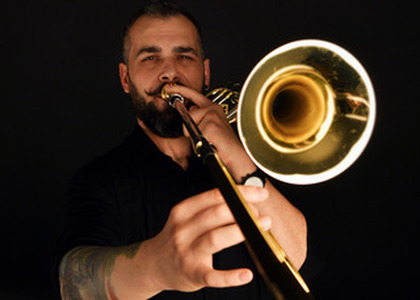> [Archived] Interviews

Interview with the trombonist Alexandru Moraru
Alexandru Moraru is the soloist that will get on Friday, the 11th of November, on the stage of the Radio Hall with the National Orchestra Radio which sings under the wand of Christian Lindberg to interpret "Mandrake in the Corner", piece of music written by the conductor of the evening.
How is it going with the repetitions?
The whole week has been fantastic, phenomenal! To me, it's been a very different week. It would be difficult to describe it, because it's not something I'm used to or have ever been, even though I also studied in America, I had concerts all over the world. But having the master Lindberg by my side, has been something else… a different type of energy this titan of the trombone carries around.
What makes this piece of music, Mandrake in the Corner, unique?
First of all, it's written by a trombonist. It's written by Christian Lindberg, the master that also conducts, who is one of the greatest soloists of this instrument. He is the man that promoted this instrument as a soloist in the last 50 years. To understand the phenomenon better: he has 170 recorded albums as a soloist of the trombone. And most plays in the last 30-40 years have been written by him. He is a great trombonist from a technical perspective. He even recorded "The Seasons" of Vivaldi, he recorded plays from oboe… he has completely exceeded the bookstore of the trombone.
No play has seemed spectacular to him, so he started "playing" with this composition, at first. He wasn't sure he wanted to create a certain concert, they were only composition exercises. For me, it's the most difficult piece I've ever played.
I understand he's an essential name in the recent history of the trombone
Exactly. Until he came up on the scene of the international music, the solo trombone plays could be counted of one's fingers; only few. After he introduced the trombone as a solo instrument, our library became big. All of a sudden, we have all types of concerts, solo accompanied plays, unaccompanied ones, chamber music… and all this only because he succeeded in getting to the great composers of those times and ask them to write a play for the trombone.
I noticed you are active on social media networks. What role does it play in an artist's activity?
Social media is the biggest platform we can cling to in order to promote this type of music as well, which, from my point of view, shouldn't be promoted, we should have it in our blood. Classical music and arts, in general, lay at the basis of everyone's moral principles. It's the little thing we should get our joy from, the things and the places… a concert hall, for example, where I go and I should get out of the daily monotony in which I'm living. I go to a concert so that I forget about myself, about the worries, about the bills, about anything, and reconnect to myself, to try to bring that mind, body&soul together. This music helps us a lot in reconnecting to ourselves.
We need to use this social media in order to promote and show its importance in our lives.
I've also seen on social media a video in which you were talking about the technical details of playing the trombone… so that you create bonds between instrumentists, I suppose?
Of course. There's also this purpose behind my posts, of trying to be on the same page, besides the fact that what I post has, first of all, an educative purpose for Young musicians of the trombone, in general. But in our case, the brass is quite the same- trumpet, trombone, horn, bass tuba… the exercises fit all of them, it's kind of the same playing techinque; only the dimensions differ.
But yes… the main purposes are education, promotion and reaching for the same page and trying to think towards the same direction, as I've learned in America at the University. The trumpet, the horn, the bass tuba, the trombone teachers… they all teach kind of the same thing and the same principles behind of how to produce the sound, what it means, how to make it unite with you, how to express yourself better, plus the level of requirements there. For example, I went at the History of Music course there, romantism, and we started with Beethoven, he explained teachers very fast- very fast meaning a three-hour course that passed very quickly- then we were given three books (every book had a few hundreds pages) and he told us: "Read until next week and make an abstract of it and write a paper of 50 pages in which you will answer the following questions…" This is the level of details I was talking about earlier.
Translated by Ema-Teodora Rădulescu,
University of Bucharest, Faculty of Foreign Languages and Literatures, MTTLC, year I
Corrected by Silvia Petrescu














